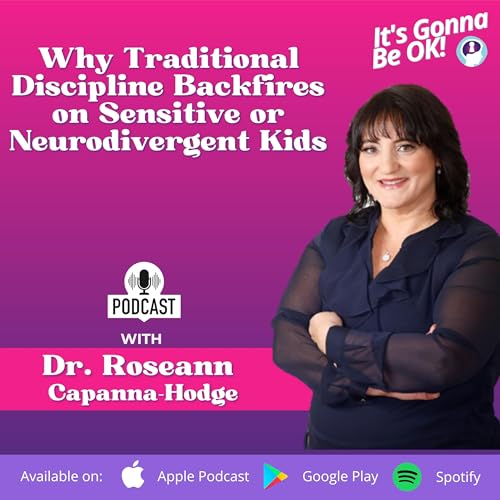
334: Why Discipline Makes My Child Worse—And What Works for ADHD, Anxious, or Sensitive Kids
Failed to add items
Add to basket failed.
Add to Wish List failed.
Remove from Wish List failed.
Follow podcast failed
Unfollow podcast failed
-
Narrated by:
-
By:
About this listen
Parenting a child who melts down no matter how hard you try can feel draining and lonely. You’ve done the time-outs, taken away privileges, tried the sticker charts—and yet the child’s behavior keeps coming back.
Instead of helping, those strategies sometimes make things worse, leaving you wondering if you’re doing something wrong. You’re not alone, and it’s not bad parenting—it’s a dysregulated brain.
In this episode, I’m breaking down why traditional discipline backfires on sensitive or neurodivergent kids, and what actually works instead. I’ll give you practical strategies to calm the nervous system first, show you why connection always beats punishment, and teach you how to build the problem solving skills your child truly needs.
Why doesn’t time-out work for my neurodivergent child?
If you’ve ever sent your child to time-out only to have the meltdown get worse, you’re not imagining it. For many neurodivergent kids, time outs don’t feel like teaching—they feel like rejection. And instead of calming down, their nervous system ramps up even more.
Research shows that parents use time-outs inconsistently, and the reality is, they’re often applied when a child is already at peak emotional dysregulation. In that state, the brain can’t process or learn. Many neurodivergent kids experience shame, anxiety, or even sensory overload instead of gaining self-control.
Here’s what’s really happening:
- Time-outs miss the teachable moment because kids are too dysregulated to reflect.
- Sensitive children feel wrong or rejected, which can trigger bigger power struggles.
- Connection is the game changer, because safety is what allows real emotional regulation.
So if time-outs keep backfiring in your family, it isn’t about bad parenting. It’s not bad parenting—it’s a dysregulated brain.
How can I stay calm when my child is melting down?
I know how exhausting it feels when your child is screaming, crying, or refusing to listen. In those moments, your own nervous system wants to react—but here’s the truth: your calm is your child’s calm. This is why I call parents the emotional anchor.
When you regulate yourself first, you model the very skill your child is struggling to build. You don’t need to get it right 100% of the time—aiming for 80% is more than enough. Perfection isn’t required for growth, and reminding yourself of that can reduce the pressure and pain you carry as a mom or dad.
A few ways to anchor yourself:
- Pause before reacting. Even 30 seconds of breathing can calm your nervous system.
- Check your body language. Slow down, soften your tone, and relax your shoulders.
- Co-regulate first. Teaching happens later—after your child feels safe and understood.
🗣️ “When you calm yourself first, you give your child the right tools to eventually calm themselves too. That’s so much sense in action.” — Dr. Roseann
You don’t have to figure this out alone.
Become a Dysregulation Insider VIP and get your FREE Regulation Rescue Kit: How to Stay Calm When Your Child Pushes Your Buttons and Stop Oppositional Behaviors.
Head to www.drroseann.com/newsletter and start your calm parenting journey today.
What do I do when discipline feels like punishment, not teaching?
Traditional discipline often focuses on stopping a child’s behavior instead of teaching new skills. But many neurodivergent kids don’t connect actions with natural consequences in the same way neurotypical kids might. That doesn’t mean they can’t learn—it just means we need to focus on the core...


